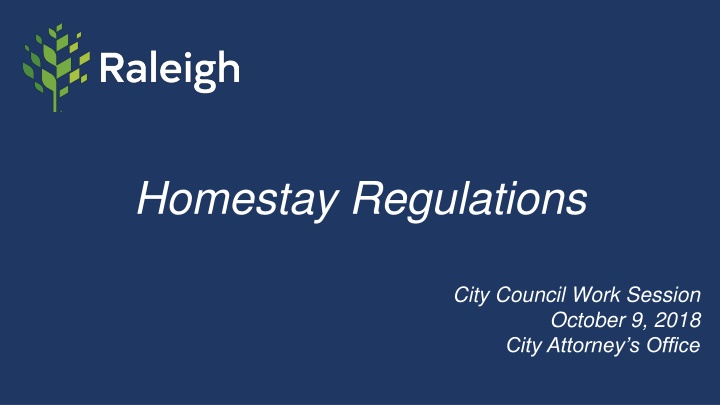Draft Homestay Regulations and Enforcement Ordinance by City Council
City Council's draft ordinance outlines key requirements and limits for homestay lodging, including permit processes, maximum stay durations, and enforcement mechanisms. Regulations cover aspects like permitted districts, number of lodgers, cooking facilities, and compliance with state and local laws. Enhanced enforcement tools include potential revocation for criminal convictions or repeated violations.
Download Presentation

Please find below an Image/Link to download the presentation.
The content on the website is provided AS IS for your information and personal use only. It may not be sold, licensed, or shared on other websites without obtaining consent from the author.If you encounter any issues during the download, it is possible that the publisher has removed the file from their server.
You are allowed to download the files provided on this website for personal or commercial use, subject to the condition that they are used lawfully. All files are the property of their respective owners.
The content on the website is provided AS IS for your information and personal use only. It may not be sold, licensed, or shared on other websites without obtaining consent from the author.
E N D
Presentation Transcript
Homestay Regulations City Council Work Session October 9, 2018 City Attorney s Office
Draft Ordinance Key Requirements Where Permitted: A. Homestays are allowed as a limited use in all Residential districts and in RX, OX, NX, CX, and DX districts. Permit and Notice Required: B. An annual zoning permit is required and proof of a Wake County tax account number for the applicant is required before a permit is issued. C. Permit fee: $208 initially, $82 renewal. G. In a Residential district, homestays are only allowed in Detached House, Attached House, Townhouse building types. D. Mailed notice must be sent at the time of application to owners within 100 and at the applicant s expense. I. Buffer from other homestays applies when a homestay is located in R-1 through R-6 districts. Size of the buffer to be determined by Council (100 , 150 , 200 , 400 , or 500 radius discussed).
Draft Ordinance Key Requirements Limits on Homestay Lodging: E. Two bedrooms (or guest rooms ) allowed for homestay use. F. Full-time resident must be on premises throughout the homestay term except for normal day-time activities. H. In R-1 through R-6 districts and in a Detached House in an R-10 district, a maximum of 2 adult lodgers (in addition to their minor children) with a total of 4 adults maximum are allowed within the home. J. 30-day maximum stay with 7-day gap for any one lodger. Limits on Properties with Homestays: K. No cooking facilities permitted ordinance in rented bedroom; however, could draft the ordinance to allow small convenience type appliances, such as a coffee maker, microwave or mini fridge. L. No exterior advertising. P. Live-Work or Day Care, Home not permitted with the use.
Draft Ordinance Key Requirements Enhanced Enforcement Tools: M. One-year revocation possible with either two criminal convictions of specified statutes (Ch. 14, Art. 27 prohibiting prostitution; Ch. 18B, Art. 3 regulating the sale, possession and consumption of alcohol; N.C. Gen. Stat. 14-71.1 concerning possession of stolen goods; N.C. Gen. Stat. 14-292 concerning gambling) in one year of occupant or owner or two verified nuisance, noise, or short-term rental violations in one year. N. Increased civil penalty ($500.00) for initial violation. O. Permittee must keep a list of all lodgers using facility for the prior 3 years. Compliance With Other Laws: Q. The permittee shall comply with all applicable State and local laws, including those related to Fire and Building Codes, housing codes, tax payments, and smoke and carbon monoxide detectors.

